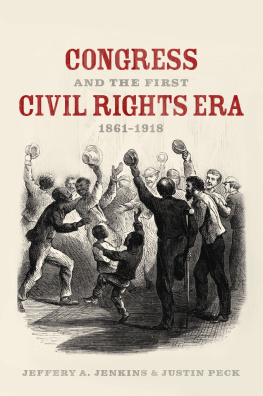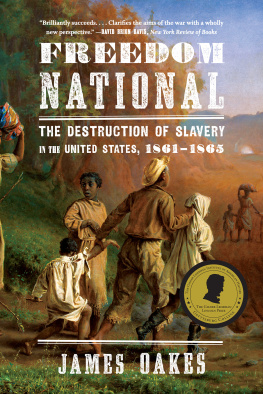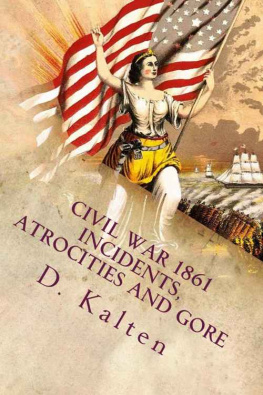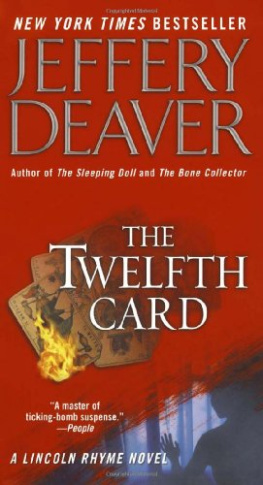Congress and the First Civil Rights Era, 18611918
Congress and the First Civil Rights Era,
18611918
Jeffery A. Jenkins and Justin Peck
The University of Chicago Press Chicago & London
The University of Chicago Press, Chicago 60637
The University of Chicago Press, Ltd., London
2021 by The University of Chicago
All rights reserved. No part of this book may be used or reproduced in any manner whatsoever without written permission, except in the case of brief quotations in critical articles and reviews. For more information, contact the University of Chicago Press, 1427 E. 60th St., Chicago, IL 60637.
Published 2021
Printed in the United States of America
30 29 28 27 26 25 24 23 22 21 1 2 3 4 5
ISBN-13: 978-0-226-75622-6 (cloth)
ISBN-13: 978-0-226-75636-3 (paper)
ISBN-13: 978-0-226-75653-0 (e-book)
DOI: https://doi.org/10.7208/chicago/9780226756530.001.0001
Library of Congress Cataloging-in-Publication Data
Names: Jenkins, Jeffery A., author. | Peck, Justin, author.
Title: Congress and the first civil rights era, 18611918 / Jeffery A. Jenkins and Justin Peck.
Description: Chicago : University of Chicago Press, 2021. | Includes index.
Identifiers: LCCN 2020036674 | ISBN 9780226756226 (cloth) | ISBN 9780226756363 (paperback) | ISBN 9780226756530 (ebook)
Subjects: LCSH: United States. Congress. | Civil rights movementsUnited StatesHistory. | African AmericansCivil rightsHistory.
Classification: LCC E185.61 .J46 2021 | DDC 323.1196/073dc23
LC record available at https://lccn.loc.gov/2020036674

This paper meets the requirements of ANSI / NISO Z39.48-1992 (Permanence of Paper).
Contents
This book tells the story of the rise and fall of the first civil rights era, viewed through the lens of action in the US Congress. The first civil rights era, as we define it, extends from 1861 through 1918, or from the Civil War through the First World War. During that time the formal status of African Americans shifted from slave to citizen and then to something in between. This distinctive path was largely determined by laws and, later, failed laws in Congress. Many books tell the story of African Americans during these years. Our book is explicitly about how the arc of civil rights was determined by Congress over these five decades and more. While there are some excellent accounts for particular periods, such as the Civil War or Reconstruction, we believe ours is the most systematic examination of congressional decision making on civil rights during this long and crucial period.
When we first sketched out an abstract for the book, we intended to cover the period from the Civil War to the presentabout 150 years of civil rights lawmaking in Congress. But as we began writing the initial chapters we realized that for the kind of comprehensive account we intended, a single book would be too long and unwieldy. We also recognized early on that, when told from the congressional perspective, the story of black civil rights coheres into two distinct arcs, each deserving to be examined on its own. When we presented our idea for two books to Charles Myers of the University of Chicago Press, he supported the plan and helped us pursue it. We eventually obtained advance contracts for the two books, and this is the first.
Many people have given us generous help and support in writing this book. Along the way, we presented portions of our research at various conferences: the Congress and History meetings (2015), the Midwest Political Science Association meetings (2016), the Southern Political Science Association meetings (2016, 2017, 2018), and the American Political Science Association meetings (2016). We received useful feedback from several people, including Jeff Grynaviski, Kris Kanthak, Thad Kousser, Ellie Powell, Barbara Sinclair, Charles Stewart, Ryan Vander Wielen, and Ryan Williamson. Additionally, in March 2019 David Bateman (Cornell), Charles Finocchiaro (Oklahoma), and Steven White (Syracuse) met with us for a day at the University of Southern California to give the full manuscript a comprehensive review. They provided excellent comments that helped us make the book considerably better. Finally, while we were writing (and revising), Charles Myers was his usual patient, thoughtful, and supportive self, and Alicia Sparrow was incredibly hands-on in helping us navigate the various steps of publication.
Although this book is now complete, the overall project is not, and we are working on Congress and the second civil rights era. We hope the larger storys first arc will stoke readers attention and satisfy their appetites until we can complete work on the second arc. It has been a long and fulfilling journey to this point, and we are pleased to have been able to provide a comprehensive account of a critical issue in premodern congressional history. We thank our families and friends for supporting us as we wrote this book and for their continuing encouragement during the second half of the project.
These frequently cited congressional publications and newspapers are abbreviated in the notes.
CG Congressional Globe
CT Chicago Tribune
CR Congressional Record
NYT New York Times
WP Washington Post
*
Introduction
Racial conflict is part of the bedrock of American politics. Although slavery is never explicitly mentioned in the Constitution itself, fights between those who opposed and supported it threatened to blow up the convention at which it was drafted. The framers (in)famously accommodated slaveholders interests by stipulating that each of the enslaved would count as three-fifths of a person in determining representation in the House and the Electoral College. The Constitution also gave states the authority to determine that slaves were considered property before the law, including a fugitive slave provision obligating the federal government to aid in the return of escaped slaves, and prohibited, until 1808, any efforts to ban the international slave trade.
From 1789 until the end of the 1850s, members of Congress protected slavery by carefully balancing free-state and slave-state preferences. After Abraham Lincolns election in 1860, however, disagreements about slaverys potential expansion westwardwhich had reached fever pitchcaused the Union to fracture, and civil war followed. Once the Confederate army surrendered in 1865, elected officials at all levels of government faced the future with no plan for patching the country back together. The Republican Party ruled in Washington, DC, but save for the addition of the Thirteenth Amendment, the Constitution was unchanged. As a result, Republicans were governed by rules that did not acknowledge the outcome of the war. To make the Northern victory permanent, they needed to either amend the Constitution itself or work within prevailing conceptions of what the document allowed.
From the moment the war ended, the political and social status of African Americans consumed national attention. By 1865, after several years of internal struggle, Republicans agreed on abolition. But the substantive meaning of black freedom remained an open question. Also to be determined was how a Constitution that had protected slavery until 1865 could be altered to ensure the civil and political rights of former slaves. While the national debate over what freedom meant in postwar America played out in each of our primary political institutions and in the states, the rights and constitutional protections afforded to African Americans would be determined to a significant degree by Congress. Because the Constitution had for years made peace with human bondage, and because lawmakers were beholden to voters who themselves supported slavery, there was no guarantee that any legal changes would meaningfully incorporate and protect freedmen.
 This paper meets the requirements of ANSI / NISO Z39.48-1992 (Permanence of Paper).
This paper meets the requirements of ANSI / NISO Z39.48-1992 (Permanence of Paper).








